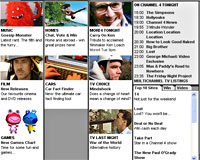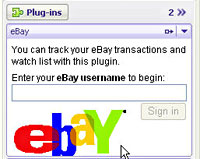 Imagine a world where Internet performance is controlled by the company who owns the cables and where speed is sold to the highest bidder. Imagine a world where some Web sites load faster than others, where some sites aren’t even visible and where search engines pay a tax to make sure their services perform at an acceptable speed. That’s the world US Telecommunications companies (telcos) such as AT&T, Verizon, Comcast and Time Warner are trying to create.
Imagine a world where Internet performance is controlled by the company who owns the cables and where speed is sold to the highest bidder. Imagine a world where some Web sites load faster than others, where some sites aren’t even visible and where search engines pay a tax to make sure their services perform at an acceptable speed. That’s the world US Telecommunications companies (telcos) such as AT&T, Verizon, Comcast and Time Warner are trying to create.
The debate centres around the ongoing review of the US Telecommunications Act and the concept of network neutrality (net-neutrality). The telcos have been lobbying congress to allow them to introduce priority services ensuring that the fastest data transfers and best download speeds are sold at a premium rate. The telcos position is widely seen to be in conflict with the most fundamental assumptions about what the Internet actually is.
To the lay person, it may seem like a laughable proposition. As Cory Doctorow (FreePress) put it, “It’s a dumb idea to put the plumbers who laid a pipe in charge of who gets to use it.” And yet the US congress is swaying towards the view of the telcos, so what’s going on?
The debate was kick-started in November 2005 when AT&T CEO, Ed Whitacre commented, “Now what they would like to do is use my pipes free, but I ain’t going to let them do that because we have spent this capital and we have to have a return on it. So there’s going to have to be some mechanism for these people who use these pipes to pay for the portion they’re using. Why should they be allowed to use my pipes?”
Whitacre’s argument boils down to the assumption that services such as Google and Yahoo are somehow freeloading on the infrastructure owned by the telcos. Cory Doctorow points out a fundamental flaw in his reasoning, “Internet companies already are paying for bandwidth from their providers, often the same companies that want to charge them yet again under their new proposals.”
![]() As Doctorow and other commentators have observed, Internet users and businesses already pay proportionally for their use of the net, allowing the owners of the infrastructure to take a further cut distorts the market in favour of those with the deepest pockets and threatens innovation and the development of new services.
As Doctorow and other commentators have observed, Internet users and businesses already pay proportionally for their use of the net, allowing the owners of the infrastructure to take a further cut distorts the market in favour of those with the deepest pockets and threatens innovation and the development of new services.
Tim Berners-Lee, inventor of the World Wide Web, weighed in to the argument saying “Net neutrality is this: If I pay to connect to the Net with a certain quality of service, and you pay to connect with that or greater quality of service, then we can communicate at that level. That’s all. Its up to the ISPs to make sure they interoperate so that that happens.”
The debate in the US is split largely along partisan lines with Republicans favouring the telcos and Democrats siding with the pro-neutrality lobby. Since Whitacre started the debate, the telcos have promoted their case heavily using extensive television advertising and lobby groups. The pro-neutrality group (comprising the bulk of the industry) has organised itself with activist Websites such as save the internet and has signed up over a million individuals to its petition, but the campaign is not going well. On May 8th the House of Representatives passed the “Communications Opportunity, Promotion and Enhancement Act of 2006,” or COPE Act while defeating an amendment (the so-called Internet Platform for Innovation Act of 2006) that would have provided protection for neutrality. The next opportunity for progress comes this week when the Senate votes on Internet Freedom Preservation Act of 2006 which also carries a neutrality friendly amendment.
Today, the legal Website Outlaw reported that two US Attorney Generals (Eliot Spitzer and Bill Lockyer) have backed the pro-neutrality cause. Spitzer wrote a letter stating that “Congress must not permit the ongoing consolidation of the telecommunications industry to work radical and perhaps irrevocable change in the free and neutral nature of the Internet”.
Whatever Spitzer and Lockyer’s influence, many commentators believe this kind of corporate influence on communications can only lead to economic censorship. As law professor and copyright activist Lawrence Lessig said in 2004 “The Internet was designed to allow competition and let the best products and content rise to the top. Without a policy of network neutrality, some of those products could be blocked by broadband providers”.
 When it comes to World Cup football Web coverage in the UK, the BBC isn’t just dribbling past its rivals – it’s positively crushing past them, according to figures released by Nielsen NetRatings.
When it comes to World Cup football Web coverage in the UK, the BBC isn’t just dribbling past its rivals – it’s positively crushing past them, according to figures released by Nielsen NetRatings. Interestingly, the Sporting Life site proved the ‘stickiest’ with punters spending the longest time on the site (an average of 36 mins each).
Interestingly, the Sporting Life site proved the ‘stickiest’ with punters spending the longest time on the site (an average of 36 mins each). Channel 4 has today launched a new broadband Simulcast service, making their live TV schedule available online for viewing, for free.
Channel 4 has today launched a new broadband Simulcast service, making their live TV schedule available online for viewing, for free. Channel 4 has, however, said that it is negotiating with US studios to add their content at a later date.
Channel 4 has, however, said that it is negotiating with US studios to add their content at a later date. Appearing in a thundercloud of enthusiasm, Channel 4 CEO Andy Duncan was on-beam and on-message and rapidly hit evangelical overdrive, describing the Web transmission as an opportunity “to build on what Channel 4 has always done – stimulate, infuriate, debate, create,” adding that he didn’t see the digital revolution as an attack on Channel 4’s power as a public broadcaster, but as a “fantastic opportunity,”
Appearing in a thundercloud of enthusiasm, Channel 4 CEO Andy Duncan was on-beam and on-message and rapidly hit evangelical overdrive, describing the Web transmission as an opportunity “to build on what Channel 4 has always done – stimulate, infuriate, debate, create,” adding that he didn’t see the digital revolution as an attack on Channel 4’s power as a public broadcaster, but as a “fantastic opportunity,” As if you don’t already spend enough time looking at your computer, the folks at Democracy would like to introduce you to the delights of free Internet TV.
As if you don’t already spend enough time looking at your computer, the folks at Democracy would like to introduce you to the delights of free Internet TV. Democracy is a not-for-profit organisation dedicated to the principal of free, open access to media through the use of open-source software.
Democracy is a not-for-profit organisation dedicated to the principal of free, open access to media through the use of open-source software. Hot on the heels of Windows Messenger Live comes Yahoo’s new upgrade to their own Instant Messaging service, offering plug-ins to let users share more information.
Hot on the heels of Windows Messenger Live comes Yahoo’s new upgrade to their own Instant Messaging service, offering plug-ins to let users share more information. Widgets and Plug Ins
Widgets and Plug Ins Of course, there’s nothing new to all this embedding malarkey, with the industry boys – Microsoft, Google, AOL and Skype – all falling over themselves to make desktop-based applications shareable over IM services, but Yahoo are hoping that by opening up Messenger to become more of a distribution platform they’ll be able to attract punter-luring new services.
Of course, there’s nothing new to all this embedding malarkey, with the industry boys – Microsoft, Google, AOL and Skype – all falling over themselves to make desktop-based applications shareable over IM services, but Yahoo are hoping that by opening up Messenger to become more of a distribution platform they’ll be able to attract punter-luring new services. Microsoft has slipped out a pair of branded Webcams designed to offer tight integration with their hideously popular Messenger service.
Microsoft has slipped out a pair of branded Webcams designed to offer tight integration with their hideously popular Messenger service. Both cams also come with built in mics, a wide angle lens to let social butterflies fit their vast armies of chums in frame and built-in cheesy video effects like falling snowflakes or twinkling stars.
Both cams also come with built in mics, a wide angle lens to let social butterflies fit their vast armies of chums in frame and built-in cheesy video effects like falling snowflakes or twinkling stars. Here’s Microsoft’s Consumer Productivity Experiences Executive Vice President (who dreams up these job titles?) Tom Gibbons to explain how LifeCams are part of a new initiative by his company to tie in hardware products to Windows Live services.
Here’s Microsoft’s Consumer Productivity Experiences Executive Vice President (who dreams up these job titles?) Tom Gibbons to explain how LifeCams are part of a new initiative by his company to tie in hardware products to Windows Live services. According to Internet research firm Nielsen/NetRatings, the BBC Sport Website is the most popular online source for World Cup news in the UK, with over 1.3 million footie fans visiting the site in the first week of the tournament.
According to Internet research firm Nielsen/NetRatings, the BBC Sport Website is the most popular online source for World Cup news in the UK, with over 1.3 million footie fans visiting the site in the first week of the tournament. “The large audience figures for the weekend shows the major advantages the Internet has in on-demand content,” he added.
“The large audience figures for the weekend shows the major advantages the Internet has in on-demand content,” he added. Mike Hemes, country manager for UK and Ireland at Packeteer, reckons that the bandwidth-busting footie action could cause big problems for IT managers, commenting: “It is likely that millions of workers will log on to watch matches due to faster Internet connections at work than at home …this will generate a huge surge in network traffic, eating into the bandwidth available to run business-critical applications effectively.”
Mike Hemes, country manager for UK and Ireland at Packeteer, reckons that the bandwidth-busting footie action could cause big problems for IT managers, commenting: “It is likely that millions of workers will log on to watch matches due to faster Internet connections at work than at home …this will generate a huge surge in network traffic, eating into the bandwidth available to run business-critical applications effectively.” Legally, a TV licence is required for any device that is “installed or used” for receiving television broadcasts, so that a networked PC used for streaming games needs a licence as well as the gogglebox at home.
Legally, a TV licence is required for any device that is “installed or used” for receiving television broadcasts, so that a networked PC used for streaming games needs a licence as well as the gogglebox at home. What’s the difference between a Wikia and a Wikipedia? Trivia, mostly – but also, Gil Penchina (pictured below). Penchina has spent eight years running eBay as a general manager and told me it was “like a whole career with any ordinary company, and I want to stop.”
What’s the difference between a Wikia and a Wikipedia? Trivia, mostly – but also, Gil Penchina (pictured below). Penchina has spent eight years running eBay as a general manager and told me it was “like a whole career with any ordinary company, and I want to stop.” But a little roaming around exposes the difference: it’s a “community thing.” According to the Astronomy Wikia, “The wiki was started with a focus specifically on topics related to the Mid Atlantic Star Party and will include reports from MASP attendees.”
But a little roaming around exposes the difference: it’s a “community thing.” According to the Astronomy Wikia, “The wiki was started with a focus specifically on topics related to the Mid Atlantic Star Party and will include reports from MASP attendees.” Why would you do that? In Gil’s view of the future, of course, it would be to prevent the more serious Wikipedia from being cluttered with Buffy trivia.
Why would you do that? In Gil’s view of the future, of course, it would be to prevent the more serious Wikipedia from being cluttered with Buffy trivia.  Sad but (supposedly) true: a new study by Nokia has found that over one in five mobile owners said they’d find losing their phone more upsetting than their wallet, credit cards and – unbelievably – even their wedding ring.
Sad but (supposedly) true: a new study by Nokia has found that over one in five mobile owners said they’d find losing their phone more upsetting than their wallet, credit cards and – unbelievably – even their wedding ring. Nokia commissioned the research in 11 countries around the globe to discover people’s attitudes towards current and future mobiles, and generally found that people *heart* the things the planet over.
Nokia commissioned the research in 11 countries around the globe to discover people’s attitudes towards current and future mobiles, and generally found that people *heart* the things the planet over. Surfing on the move
Surfing on the move New research from messaging security specialists Proofpoint has revealed that more than a third of blue-chip companies in both the US and UK hire dedicated staff to snoop on their employee’s emails.
New research from messaging security specialists Proofpoint has revealed that more than a third of blue-chip companies in both the US and UK hire dedicated staff to snoop on their employee’s emails. With companies becoming more concerned about internal security breaches rather than external threats, 34 per cent of companies claimed that their business was impacted by the exposure of sensitive or embarrassing information over the last year.
With companies becoming more concerned about internal security breaches rather than external threats, 34 per cent of companies claimed that their business was impacted by the exposure of sensitive or embarrassing information over the last year.